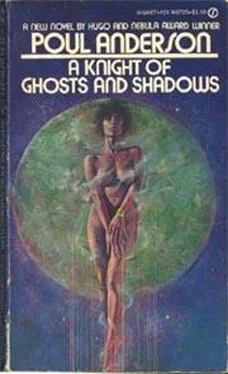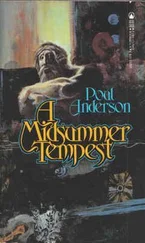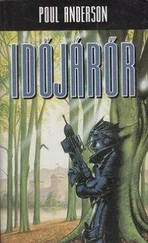Poul Anderson - A Knight of Ghosts and Shadows
Здесь есть возможность читать онлайн «Poul Anderson - A Knight of Ghosts and Shadows» весь текст электронной книги совершенно бесплатно (целиком полную версию без сокращений). В некоторых случаях можно слушать аудио, скачать через торрент в формате fb2 и присутствует краткое содержание. Год выпуска: 1975, ISBN: 1975, Издательство: Roc, Жанр: Космическая фантастика, на английском языке. Описание произведения, (предисловие) а так же отзывы посетителей доступны на портале библиотеки ЛибКат.
- Название:A Knight of Ghosts and Shadows
- Автор:
- Издательство:Roc
- Жанр:
- Год:1975
- ISBN:978-0-451-15057-8
- Рейтинг книги:5 / 5. Голосов: 1
-
Избранное:Добавить в избранное
- Отзывы:
-
Ваша оценка:
- 100
- 1
- 2
- 3
- 4
- 5
A Knight of Ghosts and Shadows: краткое содержание, описание и аннотация
Предлагаем к чтению аннотацию, описание, краткое содержание или предисловие (зависит от того, что написал сам автор книги «A Knight of Ghosts and Shadows»). Если вы не нашли необходимую информацию о книге — напишите в комментариях, мы постараемся отыскать её.
A Knight of Ghosts and Shadows — читать онлайн бесплатно полную книгу (весь текст) целиком
Ниже представлен текст книги, разбитый по страницам. Система сохранения места последней прочитанной страницы, позволяет с удобством читать онлайн бесплатно книгу «A Knight of Ghosts and Shadows», без необходимости каждый раз заново искать на чём Вы остановились. Поставьте закладку, и сможете в любой момент перейти на страницу, на которой закончили чтение.
Интервал:
Закладка:
“Aye. We must decide what to do. And we’ve fiendish little information to go on, half of it contradicting the other half. Were the Imperialists essentially right to seize our Gospodar, or was this their next step in subjugating us, or even getting us destroyed? Should we declare independence—when Merseia lurks in the wings? The Imperials can’t prevent that; our ships vastly outnumber theirs hereabouts. But if fighting starts, they could make us pay heavily.”
“You Dennitzans, human and zmay—ychan—you don’t strike me as hesitant people,” Flandry remarked. “As we say in Anglic, ‘He who dithers is diddled.’ The newscasts have been forgivably confused. But am I right in my impression that your parliament—Skupshtina—meets tomorrow?”
“Yes. In the Gospodar’s absence, the Chief Justice will preside.”
“Do you think the vote will go for secession?”
“I had no doubt of it … until I heard from Dama Vymezal and yourself.”
The captains gripped their pipes, knife handles, the edge of the table, hard. They would have their own words to say later on; but what they heard in the next few minutes would be their compass.
“If you rise and tell them—” Flandry began.
Kossara cut him off. “No, dear. That’s impossible.”
“What?” He blinked at her.
She spoke carefully, clearly. The stim she had taken made vigor shine pale through flesh and eyes. “The Skupshtina’s no controlled inner-Empire congress. It’s about five hundred different proud individuals, speaking for as many different proud sections of land or walks of life. It’s often turbulent—fights have happened, yes, a few killings—and tomorrow it’ll be wild. Do you think our enemy hasn’t prepared for the climax of his work? I know the Chief Justice; he’s honest but aged. He can be swayed about whom he recognizes. And if somebody did get the floor, started telling the whole truth—do you imagine he’d live to finish?”
“She’s right,” Kyrwedhin said.
Flandry drew on his cigarette till his face creased before he replied, “Yes, I’d supposed something like that must be the case. Assassination’s easy. A few concealed needle guns, shotted around—and as a backup, maybe, some thoroughly armed bully boys hidden away in buildings near the Capitol. If necessary, they seize it, proclaim themselves the Revolutionary Committee … and, given the spadework the enemy’s done over the years, they can probably raise enough popular support to commit your people beyond any chance of turning back.”
“If you have thought of this and not despaired,” Kyrwedhin said, “you must have a plan.”
Flandry frowned. “I’d rather hear what you have in mind. You know your establishment.”
“But I am taken by surprise.”
Kossara spoke against storm-noise: “ I know. If you and I, Dominic—especially I—if we appear before them, suddenly, in person—why, killing us would be worse than useless.”
Kyrwedhin’s tail smacked the floor. “Yes!” he cried. “My thoughts were headed your same way. Though you can’t simply walk in from Constitution Square. You’d never pass the Iron Portal alive. What you need is an escort, bodies both shielding and concealing you, on your way right into the Union Chamber.”
“How?” snapped from a village chief.
Kossara had the answer: “Ychani have always been the Peculiar People of Dennitza. The House of the Zmayi has never entirely spoken for them; it’s a human invention. If, in a desperate hour, several hundred Obala fishers enter Zorkagrad, march through Square and Portal into the Chamber, demanding their leaders be heard—it won’t be the first time in history. The enemy will see no politic way to halt that kind of demonstration. They may well expect it’ll turn to their advantage; outsiders would naturally think Merseian-descended Dennitzans are anti-Terran, right? Then too late—” She flung her hands wide, her voice aloft. “Too late, they see who came along!”
Beneath the surf of agreement, Flandry murmured to her: “My idea also. I kept hoping somebody would have a better one.”
XVII
Just before their car set down, Flandry protested to Kossara, “God damn it, why does your parliament have to meet in person? You’ve got holocom systems. Your politicians could send and receive images … and we could’ve rigged untraceable methods to call them and give them the facts last night.”
“Hush, darling.” She laid a hand across his fist. “You know why. Electronics will do for ornamental relics. The Skupshtina is alive, it debates and decides real things, the members need intimacies, subtleties, surprises.”
“But you, you have to go among murderers to reach them.”
“And I fear for you,” she said quietly. “We should both stop.”
He looked long at her, and she at him, in the seat they shared. Beryl eyes under wide brow and bronze hair, strong fair features though her smile quivered the least bit, height, ranginess, fullness, the warmth of her clasp and the summery fragrance of herself: had she ever been more beautiful? The vitality that surged in her, the serenity beneath, were no work of a drug; it had simply let her put aside shock, exhaustion, grief for this while and be altogether Kossara.
“If there is danger today,” she said, “I thank God He lets me be in it with you.”
He prevented himself from telling her he felt no gratitude. They kissed, very briefly and lightly because the car was crammed with ychans.
It landed in a parking lot at the edge of Zorkagrad.
None farther in could have accommodated the swarm of battered vehicles which was arriving. Besides, a sudden appearance downtown might have provoked alarm and a quick reaction by the enemy. A march ought to have a calming effect. Flandry and Kossara donned cowled cloaks, which should hide their species from a cursory glance when they were surrounded by hemianthropoid xenos, and stepped outside.
A west wind skirled against the sun, whose blaze seemed paled in a pale heaven. Clouds were brighter; they scudded in flocks, blinding white, their shadows sweeping chill across the world, off, on, off, on. Winged animals wheeled and thinly cried. Trees around the lot and along the street that ran from it—mostly Terran, oak, elm, beech, maple—cast their outer branches about, creaked, soughed Delphic utterances though tongue after fire-tongue ripped loose to scrittle off over the pavement. Rainpuddles wandered and wandered. All nature was saying farewell.
The ychans closed in around the humans. They numbered a good four hundred, chosen by their steadcaptains as bold, cool-headed, skilled with the knives, tridents, harpoons, and firearms they bore. Ywodh of Nanteiwon, appointed their leader by Kyrwedhin before the parliamentarian returned here, put them in battle-ready order. They spoke little and showed scant outward excitement, at least to human eyes or nostrils; such was the way of the Obala. They did not know the ins and outs of what had happened, nor greatly care. It was enough that their Gospodar had been betrayed by the enemy of their forefathers, that his niece had come home to speak truth, and that they were her soldiers. The wind snapped two standards in their van, star white on blue of Yovan Matavuly, ax red on gold of Gwyth.
“All set,” Ywodh reported. A shout: “Forward!” He took the lead. Flandry and Kossara would fain have clasped hands as they walked, but even surrounded must clutch their cloaks tight against this tricksy air. The thud of their boots was lost amidst digitigrade slither and click.
At first it was predictable they would encounter nobody. Here was a new district of private homes and clustered condominium units, beyond the scope of forcefield generators that offered the inner city some protection. Residents had sought safer quarters. An occasional militia squad, on patrol to prevent looting, observed the procession from a distance but did not interfere.
Читать дальшеИнтервал:
Закладка:
Похожие книги на «A Knight of Ghosts and Shadows»
Представляем Вашему вниманию похожие книги на «A Knight of Ghosts and Shadows» списком для выбора. Мы отобрали схожую по названию и смыслу литературу в надежде предоставить читателям больше вариантов отыскать новые, интересные, ещё непрочитанные произведения.
Обсуждение, отзывы о книге «A Knight of Ghosts and Shadows» и просто собственные мнения читателей. Оставьте ваши комментарии, напишите, что Вы думаете о произведении, его смысле или главных героях. Укажите что конкретно понравилось, а что нет, и почему Вы так считаете.











